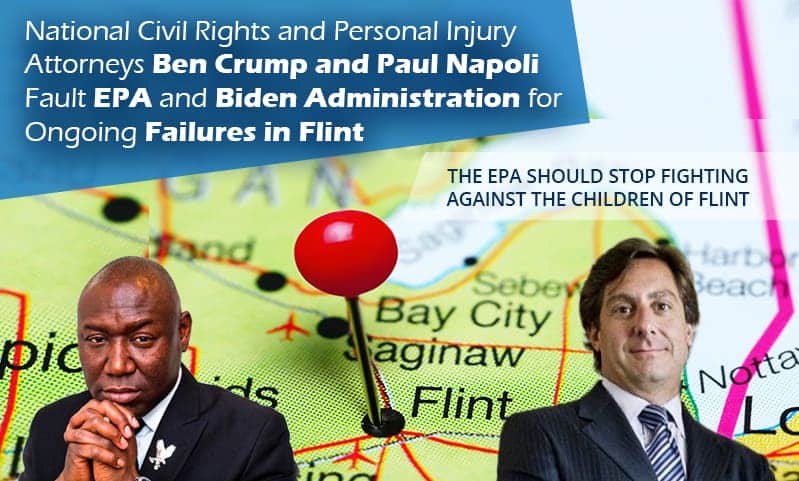Nationally renowned civil rights and personal injury attorneys Ben Crump of Ben Crump Law and Paul Napoli are speaking out against the Environmental Protection Agency (EPA) and the Biden White House for their failures to fulfill their promises to Flint residents who continue to endure the tragic consequences of the Flint poisoned water crisis.
During his 2020 presidential campaign, Joe Biden showcased environmental protection as a key element of his platform. Presidential candidate Biden spent days leading up to Election Day in Flint, Michigan, telling residents, “What happened in Flint will never happen again.” Months later, the infrastructure problem is still a very real concern for residents.
“We expected as much from the Trump administration – finding every opportunity to harm minorities. We had higher hopes for the Biden administration, who promised us they would ‘restore the soul of America.’ Well, Flint’s soul is poisoned with lead, and its children now have cognitive development issues because of it,” said Crump.
The responsibility to see through the attainment of clean water for Flint falls on the Environmental Protection Agency that, since January, has been overseen by President Biden’s administration. The Flint Water Crisis began under the Obama/Biden administration in 2014 when the EPA neglected to intervene when the Michigan Department of Environmental Quality (MDEQ) violated the Safe Drinking Water Act and the Lead and Copper Rule, according to a 2018 Inspector General’s report on the EPA. The gross disorganization of the EPA under Biden’s last term in the White House led to a delay in the federal response to the tainted drinking water in Flint, contributing to a far more damaging effect on the brain development of thousands of Flint children.
“Biden was in the office of Vice President when this crisis began, now that he is in the office of President, it is inexcusable that this is an ongoing problem. Biden speaks about the Flint Water Crisis in the past tense while touting his infrastructure plan as if it is a problem of the past. This is a nightmare that the people of Flint are still living every day,” said Napoli. “The Biden administration uses Flint as a talking point to gain support for their agenda, saying that it was a learning experience on why we need adequate infrastructure nationwide. How can something be a learning experience if the experience is still ongoing?”
Gina McCarthy, the Administrator of the Environmental Protection Agency under the Obama/Biden administration during the Flint Water Crisis, was appointed by President Biden to serve as the National Climate Advisor for the current administration. Flint residents and activists spoke against this appointment, comparing it to a slap in the face.
“If the Biden administration wants to overhaul our nation’s infrastructure and ‘build back better,’ they must first level the playing field for neglected minority communities awaiting the long-overdue and basic human right of clean drinking water. Communities like Flint have been left behind by the government time and time again,” said Crump. “Biden’s victory signaled a turning point for our nation, yet more than 100 days into this administration, Flint still faces the same problems. The Biden administration needs to act now and put pressure on their EPA to make this right for the people of Flint and show them that they were more than a bullet point on his administration’s agenda.”
In the 2018 Inspector General’s report, the EPA Region 5’s management weaknesses that contributed to a delayed federal response leading up to and during the Flint Water Crisis included failure to establish clear roles and responsibilities with the MDEQ, failure to communicate clearly and effectively, failure to use effective risk assessment protocols, and failure to proactively use available authorities and oversight tools to intervene in Michigan’s drinking water program.
The same report cites a 2010 EPA review of the MDEQ’s disinvestment from 10 Safe Drinking Water Act (SDWA) requirements. The review concluded that the MDEQ “should reconsider” those disinvestments because at least one of them could impact public health. These disinvestments continued and increased into 2016, while the EPA claimed they were more administrative and did not affect public health. The Inspector General’s report showed the connection between MDEQ’s disinvestments from the SDWA and the delay in identification of contaminants, gaps in lead reporting, and failures to provide water quality reports to residents.
“Looking at the evidence, it is clear that the EPA was reactive instead of proactive when it came to Flint residents’ water quality. The EPA had every indication that MDEQ was cutting corners that could affect public health but waited until lead was evident in the blood of thousands of residents to take action. Citizens put faith in federal agencies to do their jobs and protect them from harmful situations, such as water contamination. The EPA continues to fail Flint because seven years later, there are still residents whose water is coming from uninspected pipes that could be contaminated with lead,” said Crump.
Crump and Napoli, who represent thousands of Flint claimants, said Black plaintiffs, who were disproportionately affected by Flint water, also face barriers to getting full justice, including transportation issues, COVID impacts, access to the internet, and lower education and literacy levels.
“That’s why we are making bone lead testing available six days a week for our claimants,” Napoli said. “We want to do whatever we can to help them overcome any and all barriers and get full justice.”
